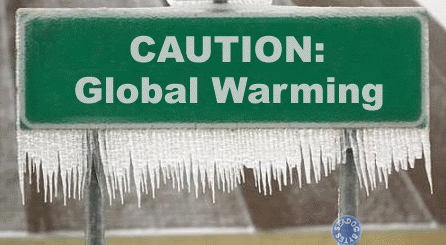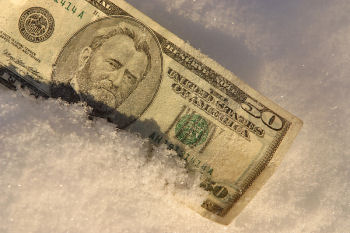Skip to comments.
Climate Change: Frisson*-laden year lies ahead (preview of 4th IPCC report)
Space Daily ^
| 12/07/2006
| AFP
Posted on 12/07/2006 8:26:28 AM PST by cogitator
Frisson means "a moment of intense excitement". (I had to look it up.) I guess they're predicting several of those next year on this topic.
Here's the text:
Nothing beats a whiff of Apocalypse for focussing minds and, next year, climate change will be the big issue that will send an icy shiver down spines followed by a clamour for action.
On February 1, the world's top scientists will issue their first instalment of a massive three-part update on global warming.
It will be the first knowledge review by the UN's Intergovernmental Panel on Climate Change (IPCC) since 2001 -- and the phone-book-sized report will convey an unvarnished message that will be bleak and quite possibly terrifying.
Those close to the IPCC say it will not only confirm the grim warnings of the past but also amplify them.
It will declare that climate change is already on the march -- and newly-discovered mechanisms in the complex climate system could worsen the threat.
"The [temperature] trends that were expected will be unchanged," says Herve Le Treut, director of research at France's National Centre for Scientific Research (CNRS).
"But one can add positive feedbacks that weren't measured a few years ago. The range of possible risks and awareness of them has widened."
In its 2001 report, the IPCC projected that global mean temperatures would rise by between 1.4 and 5.8 C (2.5-10.4 F) by 2100 compared with their 1990 level, depending on the atmospheric levels of carbon pollution, which traps heat from the Sun.
That estimated temperature range will not change, if Le Treut's rough forecast of the IPCC findings is correct.
However, the report will also warn of newly-found "positive feedbacks" -- in ordinary language, vicious circles -- that could accelerate and possibly worsen the effects of climate change.
These include the loss of polar ice and alpine snow cover, which drives up temperatures because of the loss of whiteness which reflects sunlight, and the gradual melting of Siberian permafrost, releasing gigatonnes of carbon that had been stored for millennia in the frozen soil.
The IPCC's 4th Assessment Report "is going to shock a lot of people," says Hans Verolme of the green group WWF.
The long-awaited document comes on the heels of a string of studies in the world's science journals in 2006 that pointed to Greenland's shrivelling icesheet, loss of Antarctic glaciers, acidification of the ocean by absorption of CO2 and hammer blows to biodiversity as species habitat shifts or is destroyed.
Added to that was the report by British economist Sir Nicholas Stern, which highlighted the cost of failing to tackle greenhouse gas pollution.
If no action is taken on emissions, there is a more than a 75-percent chance that global temperatures will rise by between two and three degrees Celsius (3.6-5.4 F) over the next half century, an increase that would slash global economic output by three percent, the Stern Report said.
Overall, public awareness about climate change is rising all the time -- but this contrasts starkly with the action being taken by politicians.
The annual conference of the UN Framework Convention on Climate Change (UNFCCC), which took place in Nairobi in November, was a dreary circus of showy rhetoric.
The meeting, as expected, stood by the Kyoto Protocol for curbing greenhouse gases.
But it did almost nothing concrete for determining how this treaty -- burdened by its own complexities, weakened by a US walkout -- could deliver much faster, far deeper pollution cuts for the future.
That goes to the core of the problem.
Scrapping or modifying dirty carbon-spewing power stations and vehicles costs money, and people are loath to make sacrifices if they suspect competitors are getting a free ride.
Despite this, 2006 also saw the undercurrent of coming political change, most notably in the United States, the world's No. 1 polluter.
California vowed to cap its carbon emissions by 2020 in line with Kyoto's 1990 benchmark and sued automakers for damage to the state's climate system.
And, after their crushing victory in the US Congressional elections in November, the Democrats vowed to initiate climate-change legislation early next year.
Vicki Arroyo, director of policy analysis at a US think tank, the Pew Center on Global Climate Change, cautions that the incoming two-year Congress is relatively moderate.
It is likelier to go for a gradualist approach, implementing "climate-friendly" laws that nibble at President George W. Bush's voluntary approach on carbon emissions rather than bulldoze it away completely, she predicts.
"It may not be as sweeping as, for example, the EU [carbon] trading system -- yet," she said. "But it could lay the groundwork for a trading system, for example by requiring mandatory reporting of greenhouse gas emissions."
Other action could be new laws covering emissions by utilities or road transport, both of which would be sellable to the US public on the grounds that they save energy and thus reduce US dependence on imported oil, says Arroyo.
TOPICS: Culture/Society; Foreign Affairs; Government; News/Current Events
KEYWORDS: change; climate; ipcc; warming
Navigation: use the links below to view more comments.
first previous 1-20, 21-40, 41-55 next last
To: secretagent
Isn't Antarctica cooling overall?:The interior is cooling slightly. The part of Antarctica most exposed to the rest of the world's climate, the Antarctic Peninsula, is warming strongly, and this is where glacier loss has been noted. The interior climate of Antarctica is somewhat isolated.
To: cogitator
Again, from my link above:
"Furthermore, studies have been made investigating the overall status of sea ice around Antarctica. NASA announced the results of their study in 2002 with a press release headlined “Satellites Show Overall Increases in Antarctic Sea Ice Cover.” While there are regional variations from this trend, including a decline in sea ice around the Antarctic Peninsula, the area of sea ice around much of the remainder of the continental margin has been increasing, at least over the past 25 years."
Not just the interior of Antarctica has cooled, but sea ice at "much" of the perimeter has increased.
The interior is cooling slightly. The part of Antarctica most exposed to the rest of the world's climate, the Antarctic Peninsula, is warming strongly, and this is where glacier loss has been noted. The interior climate of Antarctica is somewhat isolated.
More isolated from warm water, but why would the interior cool, instead of just warming at a slower rate than the peninsula? Increased cloud cover?
To: secretagent
More isolated from warm water, but why would the interior cool, instead of just warming at a slower rate than the peninsula? Increased cloud cover?I'll defer to those with more expertise.
Is Antarctic climate changing?
The discussion is interesting, but it doesn't really address your question. From what I've read and imperfectly processed, the cooling trends in the central Antarctic continent may be driven by upper atmosphere circulation patterns (and that's driven by ozone loss!) If you search using the two words "Antarctic cooling" using the Real Climate search box, you'll get several related articles that might help research this.
To: cogitator; ConservativeMan55; 68-69TonkinGulfYachtClub; JulieRNR21; Cindy; Smartass; MeekOneGOP; ...
Folks, I'd bet you already suspect, or maybe even already know, that we're being scammed. Here at last, in readable form, are the facts we need to refute the Global-Alarmists' constant din of specious, 'sky-is-falling' claims...
Are you as irritated as I am, by the crush of Limousine-Liberal enviro-alarmists and ex-hippie eco-liars, and their lackeys in the main-scream media, constantly shrieking their latest end-of-the-world scenarios regarding "Global Warming"??? Well, maybe there is still hope...
In this well-researched and clearly-referenced piece, Senator Inhofe, Chairman of the Senate Environment and Public Works Committee, debunks a great many of the lies we hear daily, and provides us all with clear and solid insight into the actual science of the matter. If you are interested in the truth, rather than just being spoon-fed all of the constant doom-and-gloom media hype on the subject, you will want to see this report...
|
Senator James Inhofe, Chairman, Senate Environment and Public Works Committee
Senate Floor Speech Delivered Monday September 25, 2006
I am going to speak today about the most media-hyped environmental issue of all time, global warming.
I have spoken more about global warming than any other politician in Washington today. My speech will
be a bit different from the previous seven floor speeches, as I focus not only on the science, but on the
media’s coverage of climate change. Global Warming -- just that term evokes many members in this chamber, the media, Hollywood elites
and our pop culture to nod their heads and fret about an impending climate disaster. As the senator who
has spent more time speaking about the facts regarding global warming, I want to address some of the
recent media coverage of global warming and Hollywood’s involvement in the issue. And of course I
will also discuss former Vice President Al Gore’s movie "An Inconvenient Truth."
Since 1895, the media has alternated between global cooling and warming scares during four separate
and sometimes overlapping time periods. From 1895 until the 1930’s the media peddled a coming ice
age.
From the late 1920’s until the 1960’s they warned of global warming. From the 1950’s until the 1970’s
they warned us again of a coming ice age. This makes modern global warming the fourth estate’s fourth
attempt to promote opposing climate change fears during the last 100 years... Recently, advocates of alarmism have grown increasingly desperate to try to convince the public that
global warming is the greatest moral issue of our generation. Last year, the vice president of London’s
Royal Society sent a chilling letter to the media encouraging them to stifle the voices of scientists
skeptical of climate alarmism.
During the past year, the American people have been served up an unprecedented parade of
environmental alarmism by the media and entertainment industry, which link every possible weather
event to global warming. The year 2006 saw many major organs of the media dismiss any pretense of
balance and objectivity on climate change coverage and instead crossed squarely into global warming
advocacy... ...The National Academy of Sciences report reaffirmed the existence of the Medieval Warm Period
from about 900 AD to 1300 AD and the Little Ice Age from about 1500 to 1850. Both of these periods
occurred long before the invention of the SUV or human industrial activity could have possibly
impacted the Earth’s climate. In fact, scientists believe the Earth was warmer than today during the
Medieval Warm Period, when the Vikings grew crops in Greenland... (...Don't stop here. Help debunk this media scam. Save a copy of this readable and fact-filled report from the U.S. Senate site to your computer (link below), so you will be ready when Algore, or the next enviro-windbag, comes knocking on your door shrieking that the sky is falling!!!) Continues at: http://epw.senate.gov/repwhitepapers/6341044%20Hot%20&%20Cold%20Media.pdf How many people can YOU send this to...?
"I do not feel obliged to believe that the same God who has endowed us with sense,
reason, and intellect has intended us to forgo their use." -- Galileo Galilei |


click for more
(Please FReepmail if you want on, or off, this list. I certainly have no desire to increase anyone’s stress-level. Thanks!!!)
24
posted on
12/11/2006 10:56:27 AM PST
by
Seadog Bytes
(OPM - The Liberal 'solution' to every societal problem. (Other People's Money))
To: Seadog Bytes
It's all about cold hard cash.

Our cash for their cold hands.
25
posted on
12/11/2006 11:28:00 AM PST
by
Lady Jag
(Bravery is being the only one who knows you're afraid)
To: Seadog Bytes; Berosus; Cincinatus' Wife; Convert from ECUSA; dervish; Ernest_at_the_Beach; ...
Thanks SB.
Those close to the IPCC say it will not only confirm the grim warnings of the past but also amplify them.
What a surprise! Repeat the lie often enough and make it big enough...
26
posted on
12/11/2006 11:37:01 AM PST
by
SunkenCiv
(I last updated my profile on Thursday, November 16, 2006 https://secure.freerepublic.com/donate/)
To: Seadog Bytes; Berosus; Cincinatus' Wife; Convert from ECUSA; dervish; Ernest_at_the_Beach; ...
Thanks SB.
Those close to the IPCC say it will not only confirm the grim warnings of the past but also amplify them.
What a surprise! Repeat the lie often enough and make it big enough...
27
posted on
12/11/2006 11:37:01 AM PST
by
SunkenCiv
(I last updated my profile on Thursday, November 16, 2006 https://secure.freerepublic.com/donate/)
To: Lady Jag
...Gee, and all this time I thought it was about people like Algore, and Boxer, et al seeing a bunch of global eco-idiot rats running around, and thinking, "Hey, just THINK of all the VOTES I could get if *I* could become their KING!!!"
Money and POWER. I guess they DO kind of go together.

28
posted on
12/11/2006 12:27:03 PM PST
by
Seadog Bytes
(OPM - The Liberal 'solution' to every societal problem. (Other People's Money))
To: SunkenCiv
"Those close to the IPCC say it will not only confirm the grim warnings of the past but also amplify them." Yep... regarding the IPCC, I'm afraid the phrase "Stuck on Stupid" comes immediately to mind...

29
posted on
12/11/2006 1:03:41 PM PST
by
Seadog Bytes
(OPM - The Liberal 'solution' to every societal problem. (Other People's Money))
To: Seadog Bytes
30
posted on
12/11/2006 1:13:26 PM PST
by
SunkenCiv
(I last updated my profile on Thursday, November 16, 2006 https://secure.freerepublic.com/donate/)
To: Seadog Bytes; potlatch; ntnychik; Smartass; Boazo; Alamo-Girl; PhilDragoo; ...
31
posted on
12/11/2006 3:34:55 PM PST
by
bitt
("And an angel still rides in the whirlwind and directs this storm.")
To: devolve; Seadog Bytes; bitt
Excellent post Seadog!! Very informative.
32
posted on
12/11/2006 3:39:06 PM PST
by
potlatch
(Does a clean house indicate that there is a broken computer in it?)
To: SunkenCiv
33
posted on
12/11/2006 5:17:10 PM PST
by
raygun
(Whenever I see U.N. blue helmets I feel like laughing and puking at the same time.)
To: bitt
34
posted on
12/11/2006 5:18:30 PM PST
by
raygun
(Whenever I see U.N. blue helmets I feel like laughing and puking at the same time.)
To: cogitator
Who is financing these kooks?
35
posted on
12/11/2006 5:20:35 PM PST
by
hgro
To: Seadog Bytes
36
posted on
12/11/2006 5:24:56 PM PST
by
raygun
(Whenever I see U.N. blue helmets I feel like laughing and puking at the same time.)
To: raygun
I like that cartoon, and plan to steal it, mwa-ha-ha-ha.
37
posted on
12/11/2006 5:32:27 PM PST
by
SunkenCiv
(I last updated my profile on Thursday, November 16, 2006 https://secure.freerepublic.com/donate/)
To: cogitator
Does anyone really think climate will stay the same? It has always been in a state of change.
38
posted on
12/11/2006 5:39:27 PM PST
by
gitmo
(From now on, ending a sentence with a preposition is something up with which I will not put.)
To: SunkenCiv
LOL

39
posted on
12/11/2006 5:40:42 PM PST
by
raygun
(Whenever I see U.N. blue helmets I feel like laughing and puking at the same time.)
To: potlatch; PhilDragoo; ntnychik; MeekOneGOP; dixiechick2000; bitt; Lady Jag; Liz; DoughtyOne
40
posted on
12/11/2006 6:09:06 PM PST
by
devolve
( ....terminate_liberal_media_&_neocoms)
Navigation: use the links below to view more comments.
first previous 1-20, 21-40, 41-55 next last
Disclaimer:
Opinions posted on Free Republic are those of the individual
posters and do not necessarily represent the opinion of Free Republic or its
management. All materials posted herein are protected by copyright law and the
exemption for fair use of copyrighted works.
FreeRepublic.com is powered by software copyright 2000-2008 John Robinson









